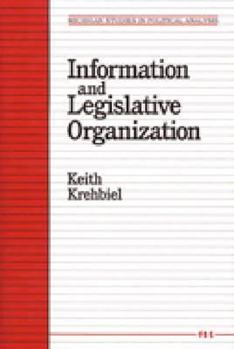Information and Legislative Organization
Select Format
Select Condition 
Book Overview
In this controversial book, Keith Krehbiel investigates and casts doubt upon a view of Congress held by many academics, journalists, and members of the lay public: that Congress is organized primarily to facilitate logrolling or "gains from trade" between legislators. The author puts forward an alternative "informational" theory that, unlike previous formal theories, highlights institutional needs and individual incentives for acquiring policy...
Format:Paperback
Language:English
ISBN:0472064606
ISBN13:9780472064601
Release Date:August 1992
Publisher:University of Michigan Press
Length:328 Pages
Weight:1.20 lbs.
Dimensions:0.9" x 6.0" x 9.0"
Customer Reviews
1 rating
A New View on Legislative Organization
Published by Thriftbooks.com User , 18 years ago
The core of Krebiel's work is an analysis of the debate between two schools of thought regarding legislative organization, the distributive and informational perspectives. Still, the both paradigms maintain some similarities, most notably their reliance on the rational choice approach. Krebiel illustrates by saying that the legislature is a competitive arena populated by "rational, goal-oriented individuals" (62). However, the differences lie in the total effects the paradigms play on legislative organization. It is Krebiel's assumption that although aspects of the distributive perspective exist in legislature, the driving force behind the institution is more accurately illustrated by the informational paradigm. Krebiel supports his hypothesis through a wide-ranging study using a host of methodological tools, both qualitative and quantitative. The distributive approach to legislative organization contends that legislature is based upon struggle between actors over limited resources. The legislator seeks to maximize his own utility, i.e. re-election, by securing gains specific to his or her constituents. This utility maximization is accomplished through economic rationality. The individual will trade support with other legislators in order to secure his personal benefit. An example of the distributive approach is illustrated in the selection of committees. According to the distributive approach, individual legislators will seek committee seats where the benefits for gain are best suited to their interests, i.e. constituent concerns. As all legislators on the same committee have similar interests, they are able to incorporate legislation that will benefit these common interests. They are able to force outcomes through policy. The informational approach leaves the Hobbsian confines of the distributive paradigm and moves towards a theory of information sharing. According to the information approach, legislative organization is based upon two aspects, policy and outcome. It is due to the uncertainty of the relationships between these two aspects that leads to a necessary amount of information for the legislators. As Richard Hall points out in his review, "Members have well defined preferences over outcomes but not policies, as members are uncertain about whether and to what extent proposed policy alternatives will have their intended effect" (495). As such, specific legislators become experts in certain segments of policy. Committee seats become less geared toward the overt attempt to secure interests and more aligned with analyzing the outcomes of policy. This, in turn, allows other legislatures to base their legislative decisions more accurately. In other words, they are given more complete information from which to base their decisions. As Krebiel points out, information then becomes a collective good.





